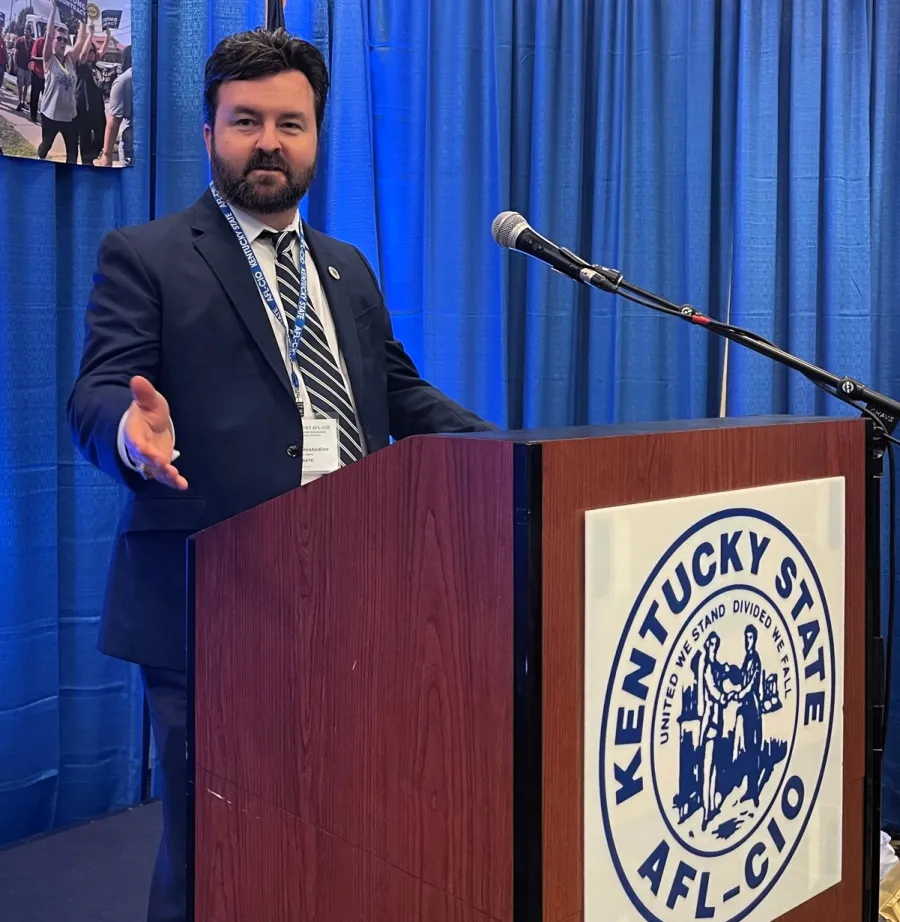Reinstedler on HB 7: 'another move by big business to weaken the value of a skilled person'

By BERRY CRAIG
Alliance for Retired Americans
It's snowing, and an 18-wheeler is barreling toward you on an icy, rural two-lane road. There's no driver in the cab.
It's a foggy, rainy night, and you're south of Louisville in heavy traffic on I-65. You're in a middle lane. Two semis--each one about the weight of a World War II Sherman tank--are passing you on both sides. Both trucks are driverless.
A frightening futuristic fantasy? That future would become the scary present if House Bill 7 passes in this session of the General Assembly. The measure would permit "fully autonomous vehicles on public highways." Translation: robot trucks. Imagine one of those little plastic remote-control toys a hundred times larger, made of steel, traveling at highway speeds and weighing up to 40 tons.
"Autonomous vehicles put the lives of everyday Kentuckians on the line," warns the Kentucky State AFL-CIO.
HB 7, whose main sponsor is Rep. Josh Bray (R-Mount Vernon), has passed out of committee and is headed to the House floor. “It's another move by big business to weaken the value of a skilled person,” state AFL-CIO President Dustin Reinstedler told the Louisville Courier-Journal's Rebecca Grapevine after the vote.
David Nickell, an American Federation of Teachers retiree, said HB 7 reminds him of What are People For? the title of acclaimed Kentucky author Wendell Berry's collection of essays. "Companies want to go to driverless trucks so they won't have to pay truck drivers,"' said Nickell who taught sociology and philosophy at West Kentucky Community and Technical College in Paducah. "It is more profitable for the big companies, and workers be damned."
Not surprisingly, the Kentucky Chamber of Commerce is all in for HB 7, claiming the bill is "an effort to address commercial truck driver shortages and support a growing economy."
The chamber's idea of a "growing economy" has always meant replacing people with machines, hefty tax breaks that enrich the already rich, getting rid of unions, driving down wages and abolishing government regulations that, besides promoting highway safety, protect workers, consumers and the environment against the greedy excesses inherent in unfettered "free enterprise."
HB 7 "is similar to a measure that almost made it into law last year," Grapevine wrote. "It passed at the very end of the legislative session but Gov. Andy Beshear vetoed the bill. Beshear said he had safety concerns and the bill was too broad and had been rushed through the legislative process."
She explained, "This year’s version includes one major change: It would require certain trucks – semitrailers that weigh over 62,000 pounds — to have humans onboard for the first two years of the law’s operation. That change was made in apparent deference to organized labor and other interest groups that say they are concerned about safety as well as potential lost trucking jobs."
State AFL-CIO Political Coordinator Liles Taylor said that "although the committee substitute does provide a brief reprieve for the heaviest trucks on Kentucky’s roads, the bill’s rather arbitrary weight threshold still doesn’t ensure the important safety precaution that is a licensed operator in other vehicles, such as smaller semi-trucks, mass transit buses, and school buses."
History, the subject this AFT retiree taught at WKCTC, clearly illustrates that a "growing economy" is fueled by more good jobs, especially union jobs. The heftier their paychecks, the more workers spend on themselves and their families--and, as a result, the economy hums.
In the 1920s, replacing workers with machinery was part of a common business model to boost profits and cut costs. The model also included keeping wages low and keeping unions at bay. Business and industry made big profits for a while. But ultimately, most workers couldn't afford to buy what the economy was churning out.
The bubble--sustained by easy credit--finally burst. The stock market crashed in 1929, and the greatest economic disaster in our history followed.
Maybe one day, autonomous vehicles will be as safe as a vehicles with a human being behind the wheel. But that day is not today, not even close.
Says the state AFL-CIO: The jury is still out on the safety of autonomous vehicle technology, also known as driverless vehicles. And until this technology can ensure these vehicles aren’t endangering their passengers or the drivers around them, Kentuckians need the safeguard that is a properly licensed, human driver to be in the vehicle to oversee, manage, and maintain these vehicles.
"The inevitable failures of this emerging technology will result in incidents that require a trained human operator to respond appropriately. Autonomous vehicle technology is not ready to be operated in Kentucky without a properly trained human operator at the wheel. Kentuckians need to put safety first. And Kentucky's roads are not safer if you have a 5,000+ pound semi-truck or bus without the safety net that is a human operator."
Meanwhile, HB 7 has to pass the full House, then pass the whole Senate. There is still time to do your part to stop this dangerous bill. Click here to contact your state representative and senator and urge them to reject HB 7.